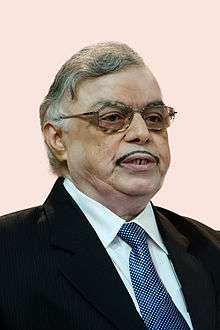P. Sathasivam
| P. Sathasivam | |
|---|---|
 Justice P. Sathasivam in 2015 | |
| 23rd Governor of Kerala | |
|
Assumed office 31 August 2014. | |
| Appointed by |
Pranab Mukherjee President of India |
| Preceded by | Sheila Dikshit |
| 40th Chief Justice of India | |
|
In office 19 July 2013 – 26 April 2014 | |
| Appointed by |
Pranab Mukherjee President of India |
| Preceded by | Altamas Kabir |
| Succeeded by | Rajendra Mal Lodha |
| Personal details | |
| Born |
27 April 1949 Bhavani, Madras State, India |
| Nationality | Indian |
| Spouse(s) | Saraswathi |
| Residence | Thiruvananthapuram, Kerala |
| Alma mater | University of Madras |
| Profession | Judge |
Palanisamy Sathasivam (born 27 April 1949) is the current Governor of Kerala, in office since 2014. He previously served as the 40th Chief Justice of India from 2013 to 2014.[1] Sathasivam is the second judge from Tamil Nadu to become the CJI.[2][3] He is also the first former Chief Justice of the Supreme Court to be appointed as the Governor of a state.[4]
Early life
Sathasivam was born into a Kongu Vellalar[5] family to Palaniswamy and Natchiammal at Kadappanallur near Bhavani in Erode district. He graduated from Government Law College Chennai after completing his BA degree Ayya Nadar Janaki Ammal College, Sivakasi.[6]
Career
Sathasivam enrolled as an advocate on 25 July 1973 at Madras. He was then appointed to the post of Additional Government Pleader, and later as the Special Government Pleader in the Madras High Court. He was appointed a permanent judge of the Madras High Court on 8 January 1996, and transferred to the Punjab and Haryana High Court on 20 April 2007. He was elevated to the post of Judge of Supreme Court on 21 August 2007. During his tenure as Chief Justice, he was the Chairman of the General Council of the Gujarat National Law University.[7] He succeeded Sheila Dikshit as the Governor of Kerala in August 2014.
Landmark judgments
Justice Sathasivam authored several path-breaking judgments including the Reliance Gas Judgment (May 2010) wherein he emphasised the use of natural resources through public sector undertakings. He observed that “in a national democracy like ours, the national assets belong to the people” and “the government owns such assets for the purposes of developing them in the interests of the people".[8]
He also delivered the verdict in the controversial triple-murder case of Stains and upheld the conviction of Dara Singh.[9] On 19 April 2010, he delivered the judgement in the Jessica Lal murder case of 29 April 1999.[10] Along with Justice B. S. Chauhan, Sathasivam delivered the judgement in the 1993 Mumbai blasts case, sentencing Bollywood actor Sanjay Dutt to five years imprisonment under the Arms Act. Dutt was asked to serve out the remainder of his sentence. According to The Hindu, "In a number of judgements, he [Sathasivam] cautioned the courts against awarding lesser sentence in crimes against women and children and showing undue sympathy towards the accused by altering the sentence to the extent of period already undergone."[2]
In January 2014, a three-judge panel headed by Chief Justice of India Palanisamy Sathasivam commuted sentences of 15 death row convicts, ruling that the "inordinate and inexplicable delay is a ground for commuting death penalty to life sentence".[11][12] Supreme Court of India ruled that delays ranging from seven to 11 years in the disposal of mercy pleas are grounds for clemency.[13] The same panel also passed a set of guidelines for the execution of a death row convict, which includes a 14-day gap from the receipt of communication of the rejection of first mercy petition to the scheduled execution date, after going through the Shatrughan Chouhan vs Union of India case.[14][15][16]
References
- ↑ "India gets a new Chief Justice: P Sathasivam". India News. 19 July 2013.
- 1 2 Venkatesan, J. (29 June 2013). "Justice Sathasivam, who convicted Sanjay Dutt, to become CJI". The Hindu. Retrieved 1 July 2013.
- ↑ "Self-made man".
- ↑ Venkatesan, J. (30 Aug 2014). "Former CJI Sathasivam to be Kerala Governor". The Hindu. Retrieved 31 Aug 2014.
- ↑ "Clamour for More SC/ST Judges in HC". Times of India. 27 December 2013. Retrieved 1 December 2014.
- ↑ "P. Sathasivam to be New Chief Justice of India". Outlook. 29 June 2013. Retrieved 1 July 2013.
- ↑ Mahapatra, Dhananjay (30 June 2013). "Justice Sathasivam to take over as new CJI on July 19". Times of India. Retrieved 2 July 2013.
- ↑ "RNRL vs RIL" (pdf). legallyindia.com. Retrieved 23 July 2013.
- ↑ "HAF Writes to Justices of Indian Supreme Court about Dara Singh Case | Hindu American Foundation (HAF)". Hafsite.org.
- ↑ "Manu Sharma vs State (NCT of Delhi)" (pdf). judis.nic.in. Retrieved 23 July 2013.
- ↑ "India top court commutes 15 death sentences over 'delay'".
- ↑ "India top court commutes 15 death sentences due to delays".
- ↑ "The case of the sisters on death row".
- ↑ "Yakub Memon hanging: Top lawyers seek late night meeting with CJI, ask for 14 days stay per SC guidelines".
- ↑ "Mercy and the machinery of death".
- ↑ "Supreme Court’s judgement on death penalty a humane approach".
External links
| Wikimedia Commons has media related to P. Sathasivam. |
| Government offices | ||
|---|---|---|
| Preceded by Sheila Dikshit |
Governor of Kerala 31 August 2014 |
Succeeded by Incumbent |
| Legal offices | ||
|---|---|---|
| Preceded by Altamas Kabir |
Chief Justice of India 19 July 2013-26 April 2014 |
Succeeded by Rajendra Mal Lodha |